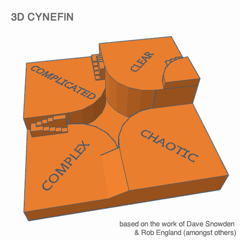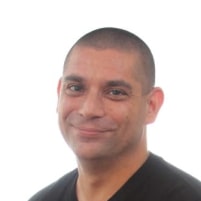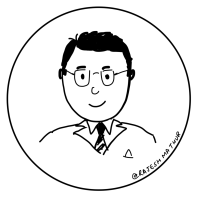-
 keyboard_arrow_down
keyboard_arrow_downFarhan Alam - Neuro-inclusivity in Digital Experiences
40 Mins
Presentation
Intermediate
People's brains are wired differently. But … we want all those different brains to have amazing digital experiences. Where is that common ground?
-
 keyboard_arrow_down
keyboard_arrow_downTony Christensen - The Kmart Agility and DevOps story
40 Mins
Discussion Group
Intermediate
The Kmart CEO, CIO, CFO, CP&CO and myself as the Head of the Agility Enablement Team will all be present to tell the Kmart Agility and DevOps story and to answer questions.
-
 keyboard_arrow_down
keyboard_arrow_downPat Kelly / Angad Lamba - Keep Calm and Roll Forward
40 Mins
Discussion Group
Beginner
Keep Calm and Roll Forward - a common aspiration in agile delivery. We’ll unpack why teams are drawn to this idea and what they need to succeed. Together, we’ll reflect on what initially inspired the approach and take part in an activity that’ll illustrate the challenges and benefits of rolling forward.
-
 keyboard_arrow_down
keyboard_arrow_downMark Grebler - Agile Beyond the Basics, a Hiring Manager's View
40 Mins
Presentation
Intermediate
This presentation is about how to do agile software development well. For people who have been doing it for a while but without necessarily understanding some of the deeper principles of how to do it well.
Some of the things we will cover:
- How do discovery and delivery work together in agile?
- What are we delivering, and how to deliver value?
- What is shift-left, and how to do it well?
- What is flow, and how to improve it?
Background:
Over the years, I've interviewed hundreds of candidates in the product-development space from Software Engineers to Product Managers and seen a pattern that most people who have been practising some form of agile software development (and some for many years) don't really understand the underlying principles well. They understand the mechanics (usually of Scrum) of how many teams work but not why those mechanics can be effective and as a result, don't really understand what to do to improve their teams.
I've seen this manifest itself in interviews where I ask people questions like "how do you go about building great teams", or "what hints do you look for to see how a team is performing", or "what are the top 3 things you look for to improve a team's performance" and most of the time I get answers that show that people have been working in teams (some that may well be high-performing) but without much of an idea why the teams are performing well.
I've also seen it manifest itself when new employees (particularly team leaders) join us, and then try to lift-and-shift their ways of working at previous companies to a new company without properly understanding why what they used to do worked in a previous context and may not work in this new context.
This presentation covers some of the things you can focus on to help improve your team's practices and understand the deeper principles behind the way you are probably working at the moment.
It's for people who may be interviewing for their next role, or who have recently joined a new team, or anyone wanted to understand how to get their teams to improve.
-
 keyboard_arrow_down
keyboard_arrow_downPenelope Barr - If you buy it, we'll build it - combining google design sprints and pretotypes
40 Mins
Skills Workshop
Intermediate
Ahh, that thorny problem, how do we place the right 'bets' on the right ideas that have the best chance of become winning products? As a lifelong learner, I'm propelled by searching for tools and techniques to support my continuous improvement journey.
I've long been a fan of the Google Design Sprint. Over the past couple of years, I've become more familiar with Pretotyping, Alberto Savoia's technique to ensure you're 'building the right it before you build it right'.
Recently I've been incorporating pretotyping into design sprints, resulting in even more focus on validating an idea and determining how likely a product is to succeed. Doing so requires higher order facilitation skills and additional pre-planning. However, in the sessions I've run to date, the addition of pretotyping has resulted in the testing increments more tightly aligned to areas of concern. This means potential blockers ie sprint goals or potential 'how-might-we' HMW statements can be effectively tested and real data gained, rather than just more internal opinion.
This approach is potentially of interest to people in organisations that have difficulty getting product to market; find it hard to align on common business goals; or who are looking for an additional evidence-gathering approach to support effective decision-making in product development.
-
keyboard_arrow_down
David Morris - Co-design the CYNEFIN game
80 Mins
Skills Workshop
Intermediate
The Cynefin framework has had a huge impact on being able to talk about complexity in systems thinking, and its widespread use facilitates many of us situationally finding which approach might suit our current problems. However, as simple as it looks, it can be difficult to learn and use.
Sure, there are alternative ways of exploring Cynefin. I've used the corridor game, designed a 3D printed model (see below), and even scripted a Lego stop-animation movie for it -- but recently got a lightbulb over the head moment -- maybe it would be easier to learn as a board game?

I've had some initial thoughts, but thought it would be fun to collaborate with others on this, to co-design what it could look like. Dave Snowden is already on board and keen to see what could be developed (he's also keen on the Lego movie, but that's for another day).
-
 keyboard_arrow_down
keyboard_arrow_downDave Martin - Power Moves for Vertical Development
40 Mins
Skills Workshop
Advanced
Agility is a mindset we say all the time. How often have you thought to yourself "I wish there was a way to actually change mindsets, some technique I can use other than teaching agile practices and hoping minseets will shift later"
Vertical coaching draws on techniques from developmental psychology and allows coaches to understand and respond to the mental models of their audience. It’s a profoundly transformative technique that has been used in other areas of coaching for decades.
In this session we will look at a brief introduction to Vertical Coaching and explore two key power moves that coaches can use to help people see new possibilities and grow and shift mindsets.
Episode V - Vertical Coaching Strikes Back
A long time ago in a galaxy far away…
Our brave band of agile coaches, having discovered the power of Vertical Development is on a quest to learn more about this mysterious force. How can they harness its power to restore peace and Agility to the galaxy?
This session will explore vertical development more deeply and introduce some exercises and vertical development power moves that coaches can use.
We will also look at the dark side of vertical development - how it can lead to judgement and fear. We will see how to avoid the lure of the dark side and learn how vertical development can be used as a force for good and not evil.
-
 keyboard_arrow_down
keyboard_arrow_downRebecca Strachan / Evangeline Aston - Culture shifting to a better future
 Rebecca StrachanChange LeadDepartment of Environment, Land, Water and Planning
Rebecca StrachanChange LeadDepartment of Environment, Land, Water and Planning Evangeline AstonFounderHelio Coaching & Counselling
Evangeline AstonFounderHelio Coaching & Counsellingschedule 1 year ago
40 Mins
Case Study
Beginner
Have you ever wanted to change the world for the better but didn't think it was possible with your particular job?
Well the good news is, everyone and every organisation has the potential to contribute to better future for society. At this session, we will show you how...
We will take a look at the interconnected system that link individuals, organisations, and society together to help you understand that by cultivating good culture from the inside, an organisation can have a positive impact on the outside.
We will explore a case study and discuss as a group the types of actions people at every level in an organisation can take to start implementing small sustainable changes that make a real impact.
You will walk away with a deeper understanding of why great organisational cultures help people, profit and the planet along with some practical tips to shift your own workplace cultures towards a better future.
-
 keyboard_arrow_down
keyboard_arrow_downTal Rotbart - SaaS Startup-to-ScaleUp - Organisational Design
40 Mins
Case Study
Advanced
Startup and ScaleUps are known stages of organisational growth for tech companies. Often less recognised is the distinct interim stage of Startup-to-ScaleUp -- this period of a tech companies time has its own unique needs and gotchas, and as a result requires an organisational design to suit.
In this interactive presentation, with elements inspired by systems thinking, I'll explore common organisational design patterns (and anti-patterns) in startups as they attempt to scale, with a focus on B2B SaaS tech companies. I'll cap it with my recommended structure for this stage of growth, including some options, based on my hard earned experience -- which includes over 10 years of successes & failure at driving scaling product & engineering teams + 10 years of being part of them, followed by a discussion.
-
 keyboard_arrow_down
keyboard_arrow_downGrant Sutton - Engineering better solutions by combining Event Storming and Human Centered Design
80 Mins
Skills Workshop
Intermediate
The best software is designed when teams collaborate to understand, prioritize and trade-off customer experience, business process, organizational and technology considerations. In this workshop, we will discuss modeling techniques that work together to enable practitioners to engineer robust solutions - for humans, by humans.
Learn how Event Storming, a workshop-based approach from domain-driven design, can help engineers to better design software in collaboration, not in opposition with business stakeholders. As we event storm to engineer robust, flexible, and extensible solutions, we'll also look at how to integrate human-centered design practices to identify so that the design responds to customer/user needs and key pain points.
During this session, we'll give you an overview of domain-driven design, and how event storming works, use case studies as an example. For those of you who've missed collaborative workshops and thousands of sticky notes, we'll also have multiple break out sessions where we'll put some of the theory into practice on example scenarios so you'll leave the session with some practical experience on how to apply the technique.
-
 keyboard_arrow_down
keyboard_arrow_downKatrina Kolt - Three practical techniques to overcome conflict in teams or organisations
80 Mins
Skills Workshop
Beginner
Whether it’s lack of alignment between team members, or friction between areas within an organisation, conflict leads to unhappiness and poor flow of work. Learn how to run a workshop to surface the antidote to conflict – empathy and common ground.
This workshop is designed to support teams or organisations who are eager to find a functional way beyond either silent, or outspoken conflict. It uses several tools from systems coaching (Relationship Myth, Lands Work and Third Entity), but no special skills are required to adapt it to your own team or workplace.
You can use this workshop in contexts such as team or organisational reset activities, or as a standalone conflict resolution intervention.
This is a learning by doing workshop, so expect to jump in and have a go!
-
 keyboard_arrow_down
keyboard_arrow_downCharlotte McKinnon - Metrics that motivate: measuring psychological safety for better team outcomes
40 Mins
Discussion Group
Beginner
Every Agile team these days seems to be up to their eyes in numbers - the scrum master can reel off the team’s velocity, cycle time, throughput and average happiness rating off the top of their head. Many of these are said to reflect how productive a team can be. How we reconcile these measures with a team's psychological safety can lead to marked differences in team performance.
In this discussion group we’ll discuss one seemingly simple question - what metrics can be used to capture motivation? Drawing on the experiences from the group and sharing horror stories about the team health check surveys that we’ve all been asked to fill in (there’s only so many ratings on a scale of 1-5 that one person can give), we’ll move past velocity and dive deeper on how to measure psychological safety, why psychological safety can lead to leaner teams with less waste, and finally how we can act on these numbers to make a different to teams after we've measured them.
-
keyboard_arrow_down
Prakriti Mateti - REACT to Imposter Syndrome
80 Mins
Skills Workshop
Beginner
70% of people worldwide have felt like an imposter at some point in their career. 46% respondents to a women-in-tech survey agreed that help overcoming imposter syndrome would make them happier and more successful. Do you worry sometimes that you're not as smart as the other people in your organisation? Or that you won't be able to keep up and they'll find out that you don't really belong there? Do you stress out about living up to the expectations of the people you manage?
People working in tech, specially those in leadership positions, often struggle to overcome prejudice and lack of privilege but still end up feeling like they don't belong, like they are a fraud, even when they're achieving success and making an impact. Imposter syndrome can affect people at any stage in their career - whether they're new to tech or in a senior leadership or executive role.
In this talk I'll go over personal experiences with imposter syndrome and practical strategies I've developed that anyone can apply to banish imposter thoughts and prevent them from getting in the way of your success, career progression, mental health, and happiness at work. An easy to remember acronym (REACT) with 5 realistic steps you can take away and practice can help you create a more accurate representation of your performance. You can take these steps away for yourself, or if you are a people leader, use them to help coach your people through the confusing world of imposter syndrome.
-
 keyboard_arrow_down
keyboard_arrow_downAlex Sloley / Roslyn Martin - Agile Cheer - Bring It On!
 Alex SloleyAgile Coach Facilitator Teacher MentorAlex Sloley
Alex SloleyAgile Coach Facilitator Teacher MentorAlex Sloley Roslyn MartinProduct ManagerRoslyn Martin
Roslyn MartinProduct ManagerRoslyn Martinschedule 1 year ago
80 Mins
Skills Workshop
Beginner
"You better bring it!
Oh, it's already been broughten!"
The purpose of cheerleading is to support and encourage their team to achieve peak performance - they give the team the extra oomph to carry them over the goal line! The cheerleaders not only support and celebrate the wins, they also encourage the team when they need to push through their trials and tribulations. Cheerleaders build the hype of the team fans by creating infectious energy - just imagine your stakeholders hyped up because of your awesome team!
In this session we will take lessons from professional cheerleading and apply them in an agile team context.
We will cover the 3 pillars of agile cheerleading – dance, chants, and emotions and explore the fundamentals and benefits of an agile cheer so that you can super-charge your teams.
BE! AGILE! BE! BE AGILE!
-
 keyboard_arrow_down
keyboard_arrow_downSally Sloley - AICAnon: Uncovering the AIC Conspiracy
40 Mins
Presentation
Beginner
This talk is a parody where I, AICAnon, an agile whistleblower, discover the AIC hiding in plain sight here in Australia. I'll share my discoveries and uncover their plot, one point at a time. Then I'll share my thoughts on what we can do to counteract the horrors that they have spread throughout our companies and hopefully prevent further spread of this infestation.
-
 keyboard_arrow_down
keyboard_arrow_downSzymon (Simon) Grzebieta - Platforms, self service and the end user, why is this so important?
40 Mins
Presentation
Beginner
Platforms as a concept have been around for a long time, probably since the dawn of the PC, and folks have being building layers of abstractions to simplify complicated process, laborious grunt work or even just day-to-day mundane repetitive work. The key focus always was to simplify the end user's experience and provide a simple and easy way to do what ever it is they need to do without having a complicated process to follow or just a command line prompt.
During the age of PC - Microsoft and Apple focused on enhancing the end user experience and year on year tried make it easier for general population to use a computer. Again the User Experience being the driver, as Steve Jobs famously said you're got to start with the customer experience and work backwards towards the technology - not the other way around.But somehow in the age of cloud, containers and "DevOps" we seem to have forgotten all about it. Platform engineering as a discipline is all the rage but we (the so called Platform Engineers) have lost the sight of our end users - the developers who are working round the clock trying to provide value to our actual customers. In this session we will cover some of the tenants of good platform design and how to build a simple-to-use, self service platform. -
 keyboard_arrow_down
keyboard_arrow_downAmanda Brown - Rapid Customer Interviews - Why Insights Don't Need to be Expensive
40 Mins
Skills Workshop
Beginner
Teams avoid gathering customer insights for the following reasons:
- time
- money
- expertise
In this session, I hope to solve all three issues by providing a technique and approach to gaining rapid customer insights by answering the questions you really need to know (plus a few tips on hustling).
Building the wrong thing is much riskier than spending a small amount of time and money on getting feature level insights. According to a study conducted by Pendo (2019), 80% of features built by product teams are either not used or rarely used by customers. By understanding if your feature, product or program meets the need of your end user ahead of time, you are far more likely to be part of the successful 20%.
-
 keyboard_arrow_down
keyboard_arrow_downStephen Callaghan - Power, Rank and Privilege in an "Agile" Environment
80 Mins
Simulation
Intermediate
At the core of Agile was the attempt to strip away the traditional hierarchical structures in order to empower people and help teams to succeed. However, just because some job titles and line management lines may have gone: power, rank and privilege can still stalk these organisations in many guises causing confusion, conflict and potentially toxic environments. Some might argue, that even with all the best intentions in the world, what we have actually created is a "Lord of the Flies" situation where that flat heirarchy and "empowerment" has actually stripped the support structures away from people who needed them most (such as minority groups, gender, race). Has "better ways of working" actually propelled us backwards? Have we forgotten to support and nurture the "people and interactions" piece with our focus on stripped down process? Or has helped shine a light on issues long covered up by making them more visible but we now have to find out new ways to approach power, rank and privilege in our modern environment.
In this workshop we will explore this usually avoided topic in the modern Australian Workplace (and within the Agile community) using an organisation and relationship systems coaching (ORSC) approach where we can start to reveal a system to itself and then start to use the natural intelligence and creativity within the group to help address this difficult but fundamental issue.This is a very interactive workshop, with no slides and those that will be attending will be expected to do most of the work(!) while guided by the experienced ORSC facilitator. Therefore each session of these workshops can be profoundly different depending on the system of people who attend. However, all participants should leave with a deeper understanding (or at the very least a whole new set of questions) on the meaning of "power" within a working environment and also an experience of how a systems inspired approach can help address such "edgy" topics.
-
 keyboard_arrow_down
keyboard_arrow_downMatthieu Siggen - Supercharge your organisation's layers of consciousness
80 Mins
Skills Workshop
Intermediate
Frederic Laloux's "Reinventing Organisations" introduced the concept of Organisational Layers of Consciousness.
This workshop will briefly sum them up before helping you dissect your own organisation and understand:
- what current level the different parts that make up your organisation are at
- what opportunities and pitfalls you may encounter by levelling up some of these parts
- what optimal level each of these parts should strive for
Note that this workshop will be underpinned by the real life example of how this is done at Mantel Group.
-
 keyboard_arrow_down
keyboard_arrow_downSoma Mazumder - #AgileHumor - Humor is Serious Business
40 Mins
Presentation
Beginner
Have you ever walked into a meeting and wished it won’t be boring and people will talk to each other? If your answer is “yes”, then maybe you could be the person who lightens up the environment with some appropriate and impromptu jokes. In this session we are going to learn what a sense of humor is, the benefits, the similarities between a stand-up comedian and a Leader, how stand-up comedy teaches us to be socially aware, and develop better EQ. Can a good sense of humor be the x-factor to build a resilient culture? Are you curious now? Come and explore the answer!
RELEVANCE
A sense of humor and coaching/leading have many relevant similarities. A person with a great sense of humor helps people to connect with each other, gains trust, and improvises their jokes based on the audience. These are also the attributes of a great leader. Having a healthy sense of humor can help model how to fail with grace, learn fast, and energize the people around you. Humor can help to create a positive environment for teams to be creative. You also need to be aware and understand appropriate humor based on your audience and when not to overdo it.

 Lisa Jacob
Lisa Jacob
 Craig Brown
Craig Brown
 Ed Wong
Ed Wong
 Susan Abishara
Susan Abishara
 Rajesh Mathur
Rajesh Mathur
